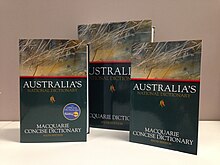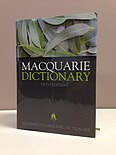This is an old revision of this page, as edited by 110.175.113.90 (talk) at 02:49, 31 March 2017 (→Seventh Edition). The present address (URL) is a permanent link to this revision, which may differ significantly from the current revision.
Revision as of 02:49, 31 March 2017 by 110.175.113.90 (talk) (→Seventh Edition)(diff) ← Previous revision | Latest revision (diff) | Newer revision → (diff) The Macquarie Dictionary Sixth Edition The Macquarie Dictionary Sixth Edition | |
| Editor | Susan Butler |
|---|---|
| Language | Australian English |
| Subject | Dictionary |
| Publisher | Macquarie Dictionary Publishers |
| Publication date | 1981, 1991, 1997, 2005, 2009, 2013 |
| Publication place | Australia |
| Media type | Print, Digital |
The Macquarie Dictionary is a dictionary of Australian English. It is generally held by universities and the legal profession to be the authoritative source on Australian English. It also pays considerable attention to New Zealand English. Originally it was a publishing project of Jacaranda Press, a Brisbane educational publisher, for which an editorial committee was formed, largely from the Linguistics department of Macquarie University in Sydney, Australia. It is now published by Macquarie Dictionary Publishers an imprint of Pan Macmillan Australia Pty Ltd. In October 2007 it moved its editorial office away from Macquarie University to the University of Sydney.
History
First Edition
The original version of the Macquarie Dictionary was based on Hamlyn's Encyclopedic World Dictionary of 1971, which in turn was based on Random House's American College Dictionary of 1947, which was based on the 1927 New Century Dictionary, which was based on The Imperial Dictionary of the English Language, which itself was based on Noah Webster's American Dictionary of the English Language second edition of 1841.
Since its first publication in 1981, its usage has grown so that over time, it has come to rival longer-established dictionaries from elsewhere in the English-speaking world as a standard authority on the English language within Australia.
Second Edition
The second edition was published in 1991 and it introduced encyclopedic content to many entries.


Third Edition
The third edition, published in 1997, made use of an inhouse corpus of Australian writing, Ozcorp, to add a large number of examples of Australian usage, to give some of the flavour of an historical dictionary. This edition also gave a good coverage of English in Asia.
Fourth Edition
The fourth edition, published in 2005, increases the number of citations, includes etymologies for many phrases and pays particular attention to Australian regionalisms.
Fifth Edition
The fifth edition was published on October 2009 and places particular emphasis on words relating to the environment and climate change.
Sixth Edition
The sixth edition was published on October 2013 and includes the usual update of new words along with a small collection of words from World War I. It leaves encyclopedic content to the dictionary online.
Seventh Edition
The seventh edition of the Macquarie Dictionary was published on 28 February 2017
The dictionary records standard Australian English spelling, which is closer to British spelling than American spelling, with spellings like colour, centre, defence and practice/practise (noun/verb). It gives -ise spellings first, listing -ize spellings as acceptable variants, unlike the Oxford English Dictionary and some other dictionaries of British English, which continue to prefer -ize to -ise in spite of the opposite tendency amongst the British general public (see Oxford spelling).
One difference from British usage is the word program which the Macquarie Dictionary gives as the preferred spelling.
Collaborations
Word of the Year
See main article on Word of the Year.
Versions
A number of smaller versions are available, including a pocket edition, as well as companion volumes such as a thesaurus. The latest edition of the main complete version of the Macquarie Dictionary is the 6th, published in 2013. The Macquarie Australian Slang Dictionary published in 2004 is an up-to-date record of Australian slang. A range of dictionaries from the complete to a small dictionary is available as an IOS application.
Macquarie Dictionary Online
The Macquarie Dictionary Online was initially the digital version of the print fourth edition. From 2013 it is the most complete version of the dictionary with greatest coverage of encyclopedic and non-encyclopedic entries. It offers spoken pronunciations. It is available by subscription.
References
- "Reference". University of Melbourne.
- ^ Richards, Kel (2015-03-01). The Story of Australian English. NewSouth. ISBN 9781742241906.
- "Macquarie Dictionary, uni split amicably". The Sydney Morning Herald. Retrieved 2015-11-17.
- Coulthard, Malcolm; Johnson, Alison (2010-03-30). The Routledge Handbook of Forensic Linguistics. Routledge. ISBN 9781136998720.
- Kachru, Braj; Kachru, Yamuna; Nelson, Cecil (2009-02-17). The Handbook of World Englishes. John Wiley & Sons. ISBN 9781405188319.
- "News | The University of Sydney". sydney.edu.au. Retrieved 2015-11-18.
- "Macquarie update: new words for a new age". Illawarra Mercury. Retrieved 2015-11-18.
- "Macquarie Dictionary Seventh Edition". Pan Macmillan. Retrieved 2016-12-06.
- Nieuwenhuizen, Agnes (August 9, 2014). "A timely word from the wise, Susan Butler". The Australian. Retrieved November 18, 2015.
- "Macquarie Dictionary Search Word program". /www.macquariedictionary.com.au. Macmillan Publishers Group Australia. 2014. Retrieved 15 April 2015.
External links
- Macquarie Dictionary Online (subscription required)